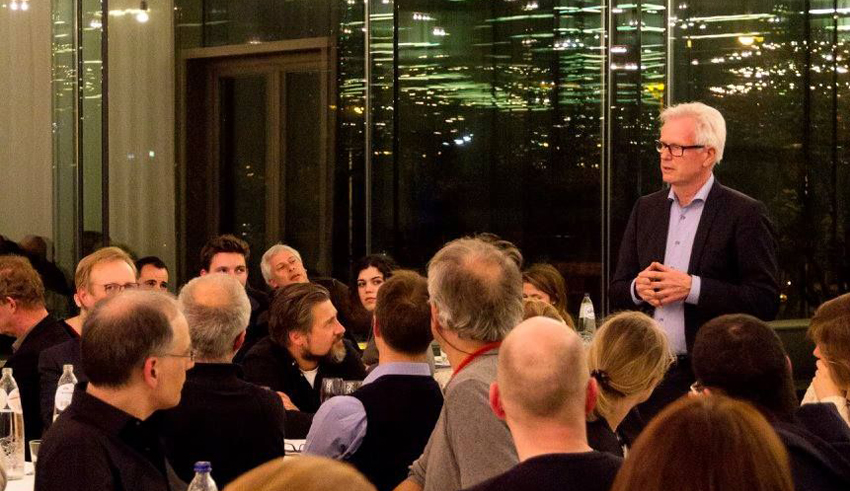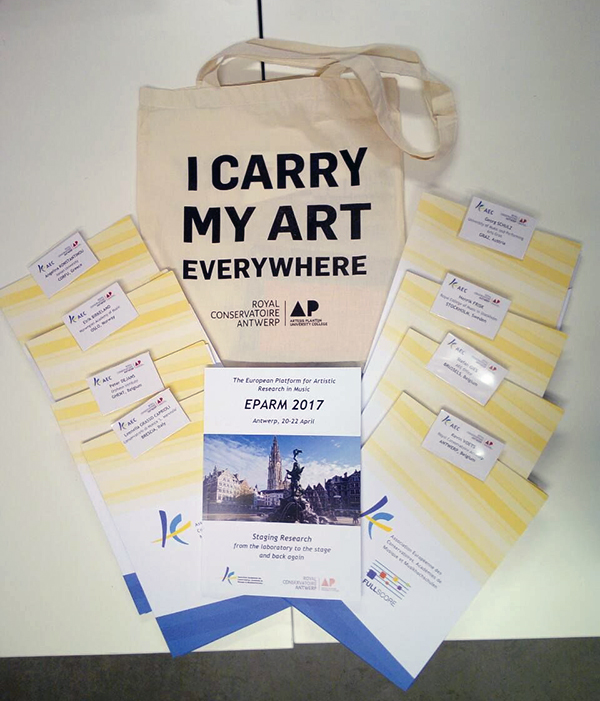Landing in Brussels you find yourself at a bustling airport full of the sounds of French and Flemish in addition to the usual mix of international languages. You make your way across the whole airport till you get to the bus terminal where the Antwerp Express whisks you swiftly from Europe’s capitol to the beautiful Flemish city of Antwerp.

In the south part of the city you find the Royal Conservatoire of Antwerp. The conservatory is a spacious and bright building located near the highway. You can’t hear the sound of the highway from the school, but its constant flowing energy is reflected in the flow of energy and openness to new ideas at the Conservatory.
From April 20 to 22, I had the opportunity to visit the EPARM conference or European Platform for Artistic Research at the Royal Conservatoire in Antwerp. I was sent there as a kick-off for the brand new MdW Arbeitsgruppe, or committee, for research into artistic Doctorates, with the generous assistance of the Academic Senate. Here’s just a bit of background to the conference: The EPARM conference is organized by the AEC or, Association Européenne des Conservatoires, Academies de Musique et Musikhochschulen. The AEC is a European cultural and educational network with around 300 member institutions for professional music training from 57 countries. The MdW, University for Music and the Performing Arts, Vienna, has been a member for a great many years. The EPARM conference has been put on annually since 2013 in order to bring together music researchers, educators and performers from around the world to listen to and present projects in Artistic Research and to exchange in engaging conversations on the topics.
The theme of this year’s conference was, Staging Research: from the laboratory to the stage and back again. The participants reflected and discussed the bonds between artistic research and professional music making. The conference was absolutely pulsing with new ideas; it was exciting to be a part of it! The palpable creative and, above all, innovative energy present was simply impressive.

There were around 19 presentations on various aspects of Artistic Research. The presentations were diverse, ranging from: composers, conductors, other musicians and stage directors analyzing their creative processes; to performers reflecting on the staging of their performances both on stage and online, to reflections on programming concerts as a creative strategy in itself; to stretching the boundaries of interpretation to their very limits just to see what happens when you return to the traditional interpretation. After every presentation there was time for animated discussion and exchange of ideas. The conference really came to life at the networking sessions between the presentations which were a vibrant intellectual exchange. A clear picture emerged of Artistic Research on the doctorate or 3rd cycle level existing in many heterogeneous forms, all of which have one thing in common: the generation of new knowledge and the creation of new roles and approaches for musicians, music and performance.
While I was there I had the opportunity to meet many people from different Institutions from around the world who are running and working at successful doctoral programs for Artistic Research. Among them were Peter Dejans, of the Orpheus Institute in Ghent, Peter Tornquist and Darla Crispin of the Norwegian Academy of Music, Anu Vehviläonen and Kristiina Ilmonen of the Sibelius Academy in
Finland, Denise Neary from the Royal Irish Academy of Music, and of course the team of 3 from our very own Graz University of Music and the Performing Arts: Georg Schulz, Deniz Peters, and Michael Kahr, — to mention just a few. While each institution has its own approach to offering Doctoral or 3rd cycle studies in Artistic Research, they all have in common a willingness to work with each other and newcomers towards furthering the field of Artistic Research, and an openness to new and innovative ideas.
One of the presentations I found most fascinating was Schubert Revisited, presented by singer Frank Havroy and pianist Gunnar Flagstad, both associate Professors at the Norwegian Academy of Music. In their performance they stood the boundaries of traditional Schubert Lied interpretation on their head through experiments with different musical styles. The resulting music held the audience on the edge of their seats! The experiments dealt with such questions as, “What is a tradition, and should we see ourselves as being at the end or at the beginning of a tradition?” and, “How obliged are we to be a part of a performance practice, or should we be obliged to seek to challenge the performance practice?” The outcomes from this presentation were well received by the public and the question and answer session following spilled out into the conversations in the Foyer, thus stretching conference boundaries much in the same way as the experiments themselves stretched musical boundaries.
The excellent presentations were too numerous to delve into thoroughly here, but I’d like to mention one other presentation, that of the vocal artist, Charulatha Mani, a Doctoral Studies researcher from the Queensland Conservatorium of Music at the Griffith University in Brisbane, Australia. The subject of her presentation was: Using the lens of South Indian Carnatic tradition (a vocal improvisation and story-telling tradition in South India) to re-imagine Claudio Monteverdi’s writings for the voice in his musical dramas. Charulatha Mani also did some work on her research topic at the Academy of Music in Oslo, Norway and it was the Director of the Arne Nordheim Center for Artistic Research at the Norwegian Music Academy who brought the relevance of this research in particular and Artistic Research in general beautifully to the forefront with her comment, (I’ll paraphrase it from memory here), “…through her research, Charulatha Mani finds meaningful parallels and common ground between the Eastern and Western musical traditions. In a world where cultural and political Nationalism threatens to re-emerge, this project illustrates perfectly the important role Artistic Research plays in enabling and promoting artistic and cultural Pluralism and interdisciplinary work in the Arts and Sciences, building bridges, not walls.”
The most striking impression I took with me from the conference was that Artistic Research is empowering for musicians. This empowerment is inherent in the fact that the musician, instead of being trapped in the passive role of the “object-to-be-researched”, he or she, with all his or her own musical activity, is brought into the active role of the researcher. The results or outcomes of this active research of one’s own activity generates new knowledge, better musical performances and new interpretations that would otherwise have never been attainable.
During the conference it became clear to me that Artistic Research is a way of harnessing the already present talent and academic potential of students and faculty in order to produce new and innovative artistic and intellectual accomplishments. The outcomes of Artistic Research are often unexpected and, exactly for this reason, fascinating and inspiring. A big part of the resources is already in place at professional schools of music, one must only put them to use to take part in these exciting research processes. Another important impression I came away with is that in Europe, Artistic Research is by no means forced to take place in a vacuum. There’s no need to rediscover the wheel. The EPARM offers its members the opportunity to be part of a lively, creative and productive international community for Artistic Research. This network supports and promotes research and researchers in music the world over.
Through the interesting and enlivened discussions I had the opportunity to take part in at the conference with musicians and researchers from around the world, it became clear to me that Artistic Research at the Doctoral or 3rd cycle level is an essential and for the arts and music indispensable method for the generation of new knowledge and the further development of music. When you consider that the purpose of Universities of the Arts includes but isn’t limited to career preparation or the handing out of job qualifications, but is much more about the establishment of new roles and relevance for art and artists in society and above all the generation of new knowledge, it becomes clear that Artistic Research actually justifies and reinforces the need for Universities of the Arts in society.

